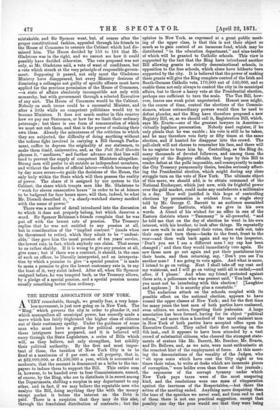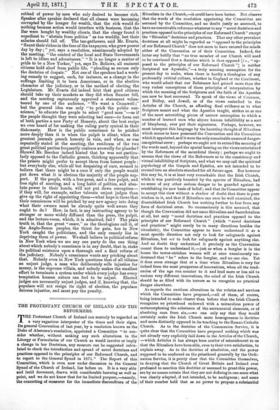THE REFORM ASSOCIATION OF NEW YORK.
A VERY remarkable, though, we greatly fear, a very hope- 11 movement, is just now going on in New York. The "Ring," which governs the city in order to plunder it, and which monopolizes all municipal power, has recently made a move which has fairly frightened the higher class of citizens out of their customary apathy. Under the guidance of some man who must have a genius for political organization these intriguers have prepared, and it is believed will carry through the State Legislature, a series of Bills which will, as they believe, not only strengthen, but solidify their political authority. By the first and most impor- tant of these, the taxation of New York City is to be fixed at a maximum of 2 per cent. on all property, that is, at $22,000,000, or £4,500,000 a year, which is accounted so moderate, that the amount is denounced as a bribe to the tax- payers to induce them to support the Bill. This entire sum is, however, to be handed over to four Commissioners, named, of course, by the Ring, who are to distribute it in secret among the Departments, shifting a surplus in any department to any other, and in fact, if we may believe the reputable men who analyze the Bill, doing anything they like with the money except pocket it before the interest on the Debt is paid. There is a suspicion that they may do this also, through the fraudulent distribution of contracts ; but the
opinion in New York, as expressed at a great public meet- ing of the upper class, is that this is not their object so much as to gain control of an immense fund, which may be distributed "in the education department," and nine-tenths of which will be granted to Catholic schools. This view is supported by the fact that the Ring have introduced another Bill allowing grants to strictly denominational schools, in opposition to the free schools, which alone have hitherto been supported by the city. It is believed that the power of making these grants will give the Ring complete control of the Irish and South-German Catholic vote, 170,000 out of 540,000, and so enable them not only always to control the city in its municipal affairs, but to throw a heavy vote at the Presidential election, perhaps one sufficient to turn the scale. The Tax Bill, how- ever, leaves one weak point unprotected. Honest men might, in the course of time, control the elections of the Commis- sioners, whose extraordinary powers would then be used to defeat plunder, and the Ring have therefore proposed a new Registry Bill, or, as we should call it, Registration Bill, which, says Mr. Evarts—one of the greatest lawyers in America— virtually legalizes personation. Nobody need register, if he only pleads that he was unable ; his vote is still to be taken, and he may therefore vote forty or fifty times at the same election, and if hunted for disappear into the crowd. The poll-clerk will not choose to remember his face, and there will be no register to trace him by. Controlling, as the Ring do, many thousands of devoted followers, and among them the majority of the Registry officials, they hope by this Bill to render defeat at the polls impossible, and consequently to make the City Treasury permanently theirs, besides seriously affect- ing the Presidential election, which might during any close struggle turn on the vote of New York. The ultimate object of this move, we should add, is to obtain command of the National Exchequer, which just now, with its frightful power over the gold market, could make any confederate a millionaire in a day. How well justified is this hope of controlling elections by personation is evident from a single story told by Mr. George C. Barrett to an audience assembled at the Cooper Institute, which we give in his own words. A friend of his wished for an office in one of the Eastern districts where " Tammany " is all-powerful. "and he told me that on the day of election he went in his own interest, with his brother, to look after things. He repeatedly saw men walk in and deposit their votes, then walk out, take their caps and turn them—backs to the front, front to the rear—and then walk back again and say to the inspector, Don't you see I am a different man ? my cap has been changed ; ' and then they would immediately vote again. He saw those men go out again and put their pantaloons into their boots, and then returning, say, Don't you see I'm another man ? I am going to vote again. And what is more, I intend to go on voting. Next I shall take off my coat and my waistcoat, and I will go on voting until all is ended,—and after, if I please.' And when my friend protested against these acts, a policeman who was present said, You look here, you must not be interfering with this election! [Laughter and applause.] It is anarchy plus a constable." The audacious attack on the schools, coupled with its possible effect on the national election, appears to have roused the upper classes of New York ; and for the first time for many years the best men of both parties have coalesced, even editors, we notice, forgetting their jealousies. A large association has been formed, having for its object "political reform," and more than a hundred of the most eminent men in New York of both parties have accepted office upon its Executive Council. They called their first meeting on the 6th inst., and it appears to have been attended by a vast crowd of substantial citizens, who cheered the strongest state- ments of orators like Mr. Barrett, Mr. Beecher, Mr. Evarts, and Dr. Bellows, and, as we note, were most enthusiastic at the remotest hint of the employment of force. At this meet- ing the denunciations of the venality of the Judges, who
"sit upon seats which have cost the City eight or ten times their value, to write at desks which are incarnate pieces
of corruption," were bolder even than those of the journals ; the exposures of the corrupt tyranny under which New York pays taxes were of the most unsparing kind, and the resolutions were one mass of vituperation against the inertness of the Respectables,—but there the action of the meeting ended. Anything more despairing than the tone of the speeches we never read, and from end to end of them there is not one practical suggestion, except that possibly one day the poor would see that they were being robbed of power by men who only desired to become rich. Speaker after speaker declared that all classes were becoming corrupted by the hunger for wealth, that the rich would do nothing because action would interfere with business, that the Bar were bought by wealthy clients, that the clergy found it expedient to "abstain from politics" as too worldly, lest their salaries should fall off. The tax-gatherers, said Mr. Evarts, "flaunt their riches in the face of the taxpayers, who grow poorer day by day ; " yet, says a resolution, unanimously adopted by the meeting, "the control of the local and State Governments is left to idlers and adventurers." "It is no longer a matter of pride to be a New Yorker," yet, says Dr. Bellows, all eminent citizens hold aloof from public life, "pleading as excuse only the doctrine of despair." Not one of the speakers had a work- ing remedy to suggest, such, for instance, as a change in the suffrage limiting it to born Americans, or in the elective character of the judiciary, or in the method of electing the Legislature. Mr. Everts did indeed hint that good citizens should take up their muskets as they did when Sumter fell, and the meeting rapturously approved a statement volun- teered by one of the audience, "We want a Cromwell ;" but the general idea was only "to prick the public con- science," to educate the people to select "good men "—as if the people thought they were selecting bad ones—to form out of both parties a new Party of Honesty, about the best recipe we ever heard of for making the ruling party cynical in their dishonesty. How is the public conscience to be pricked more deeply than it is when the pulpit is silent, when the greatest journals preach honesty in vain, and when, as was repeatedly stated at the meeting, the residuum of the two great political parties frequently coalesce avowedly for plunder? Shrewd Mr. Beecher indeed hinted that he was not particu- larly opposed to the Catholic grants, thinking apparently that the priests might prefer to accept them from honest people ; but everybody else, while all but despairing of cure, seemed to believe that there might be a cure if only the people would put down what it is obvious the majority of the people sup- port. If the people, with a free press, and a free pulpit, and free right of meeting, and a long habit of politics, and abso- lute power in their hands, will not put down corruption— if they will, for example, rather tolerate unjust judges than give up the right of appointing them—what hope is there that their consciences will be pricked by any new agency into doing what their owners must be already quite well aware they ought to do V How, in fact, is any instructing agency to be stronger or more widely diffused than the press, the pulpit, and the lecture-room, which, it is admitted, fail The plain truth is, that the great "snare," as the theologians call it, of the Anglo-Saxon peoples, the thirst for gain, has in New York caught the politicians, and the only remedy lies in depriving them of power. We shall believe in political reform in New York when we see any one party do the one thing about which nobody's conscience is in any doubt, that is, stake its political existence upon a thorough and a final reform of the judiciary. Nobody's conscience wants any pricking about that. Nobody even in New York questions that of all villains an unjust judge, a man who deliberately sells injustice for money, is the supreme villain, and nobody makes the smallest effort to terminate a system under which every judge has every temptation human nature can feel to be unjust. Elected judges are necessarily unjust judges, and if, knowing that, the populace will not resign its right of election, the populace decrees injustice, and must pay the penalty.



































 Previous page
Previous page